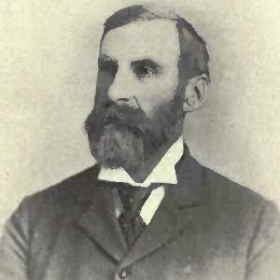Parliamentary Representative for Dundas County
by Susan Peters,
Dundas County Archives

Andrew Broder is one of those men in history who has generated such a level of respect that municipalities have named streets (and an island in the St Lawrence) after him, and yet the current population generally has no idea who he was. Andrew, or Andy, as his friends called him, embraced all of Dundas County. He was born of Irish immigrants in Franklin County Quebec. They had emigrated from Northern Ireland to forge their way in the world. It is not known when they left Ireland, or why, but they were in Canada East, or Quebec, by April 16, 1845, when Andrew was born there.
There was a steady flow of immigration from impoverished Ireland to Canada during the early 1800s. Many came to this area in the 1820s to work on building the canal system. While the Irish Potato Famine brought the largest level of immigration, this did not really begin until 1845. This was caused by a fungus that attacked the potato crop. The problem with this was that it was the main food source of the poor tenant farmers. The fungus could wipe out entire fields of potatoes in a very short time, and it spread throughout Ireland between 1845 and 1852. By 1847, it wiped out the majority of the diet of the tenant farmers. Potatoes were not only the major aspect of their diet, they were also how they paid their rent to the land owners. Many of these tenant farmers were struggling long before the potato famine. Systematic racism was rampant with these tenant farms, life was a struggle for many. The dream of a better life was probably the reason why they made the trek across the Atlantic and a new beginning.
The Broder family expanded rapidly in Franklin, with a new baby born every couple of years, Andrew being the eldest child. Not much is known about his life in Quebec. We do know that according to the STORY OF DUNDAS, he left home at age 17 to engage in farm work in Massachusetts near Boston. After this he studied in Huntington, Quebec and then later at the Malone Academy in New York. He was also serving the militia in the Fenian Raids of 1866. In 1868, he had moved to West Winchester and had established himself as a merchant, as well as a farmer. Unfortunately, newspapers of this early era are pretty rare for these dates, so I was not able to locate any ads for his business. While it is known that he was a merchant, it is not known what he sold.
In 1875, Andrew Broder decided to become a politician. His motivations toward this are totally speculative. In any case, he was elected to represent Dundas County in the Ontario Legislature as a Conservative Member. A report on his history with the Legislative Assembly of Ontario indicates that he served Dundas County between January 18, 1875 and November 15, 1886. During this time, he served on a number of Committees including Municipal Law and Printing. According to his obituary in the Winchester Press (January 10, 1918), his focus was to “bettering agricultural Conditions” in Dundas County.
We also know that his life was not all politics. On March 11, 1884, he married Caroline Summers of Winchester Township and on June 1, 1885, his son Harry was born. On March 13, 1888, their son Fred arrived, followed by William Broder in Morrisburg on April 29, 1893. On the first of May 1895, their daughter Carrie was born. Sadly, his wife Caroline died the next day, likely from complications of the birth. We do know that from 1892 to 1896 he was living in Morrisburg and acted as the Collector of Customs for the Federal Government.
We have no idea why he was motivated to enter the political arena again, but in 1896 he resigned from his Customs Collector Post and ran for the Federal House of Commons. He held his Conservative seat in the Canadian Parliament from 1896 until he retired in 1917. In 1916, he became a member of the Privy Council. In his obituaries in the Winchester Press and the Chesterville Record, both on January 10, 1918, he is referred to as the “Abe Lincoln” of Canada, because he said he governed for the common man. He also shared Lincoln’s mission to be honest and true to his cause. One report stated that: “his natural humor, genial disposition and cheery manner endeared him to a very wide circle of friends”. One such friend was fellow Dundas County resident Sir James Whitney, the Premier of Ontario from 1905 to 1914. The Ontario Archives has quite a collection of correspondence between the two men. He died of heart failure according to his death certificate. He is buried in Mariatown beside his wife Caroline.
